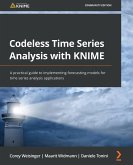
Broschiertes Buch
A practical guide to implementing forecasting models for time series analysis applications
19. August 2022
Packt Publishing

19,99 €
Versandfertig in 1-2 Wochen
Gebundenes Buch
Leveraging Organizational Practices for Equity and Results
30. September 2021
Routledge
| Broschiertes Buch | 59,99 € | |
| eBook, ePUB | 38,95 € | |
| eBook, PDF | 38,95 € |
Broschiertes Buch
Leveraging Organizational Practices for Equity and Results
30. September 2021
Routledge
eBook, PDF
29. September 2021
Taylor & Francis eBooks
eBook, ePUB
29. September 2021
Taylor & Francis eBooks
Gebundenes Buch
Controversial Issues, Current Research, Approaches and Programs
1. Februar 2024
Routledge / Taylor & Francis
| eBook, ePUB | 52,95 € | |
| eBook, PDF | 52,95 € |
eBook, ePUB
1. Februar 2024
Taylor & Francis eBooks
eBook, PDF
1. Februar 2024
Taylor & Francis eBooks
Ähnlichkeitssuche: Fact®Finder von OMIKRON
